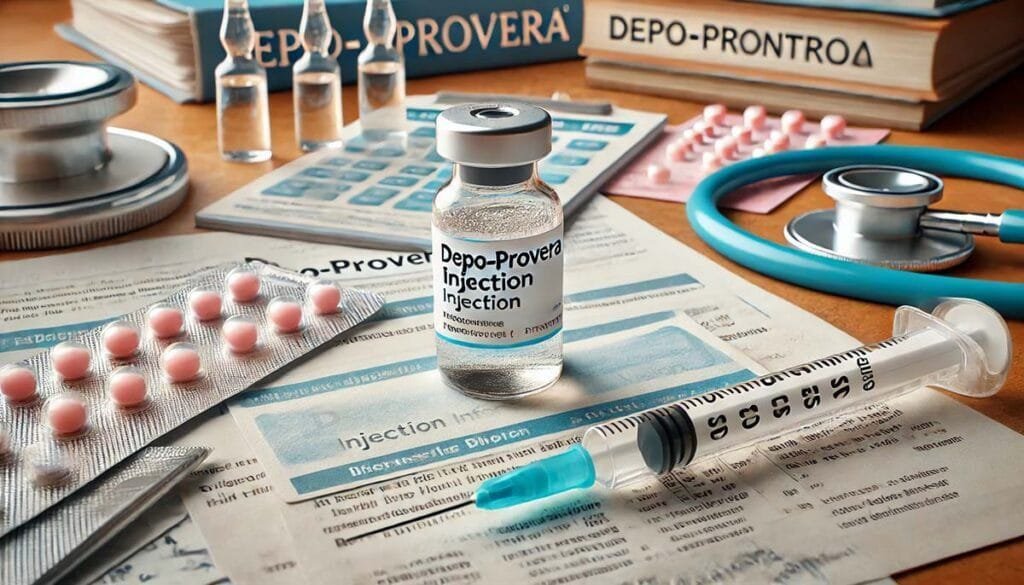Depo-Provera Lawsuit: Shocking Link to Brain Tumors Exposed!

Depo-Provera is a birth control shot used by millions of women. It promises convenience—one injection every three months prevents pregnancy. But now, it’s at the center of a major legal battle.
A growing number of women have filed lawsuits against Pfizer, the manufacturer of Depo-Provera. They claim the drug caused serious health problems, specifically brain tumors called meningiomas. A 2024 study in The BMJ found that long-term Depo-Provera users faced a 5.6 times higher risk of developing these tumors. This shocking discovery has led to legal action across the country.
The Depo-Provera lawsuit accuses Pfizer of failing to warn users about this risk. Women trusted this contraceptive for years, unaware of potential dangers. Now, many are dealing with life-changing medical issues. Some have undergone surgery. Others suffer from chronic symptoms like headaches, vision problems, and seizures.
As more lawsuits emerge, the case is gaining national attention. In February 2025, multiple lawsuits were combined into a Multidistrict Litigation (MDL) for efficiency. This legal battle could have major consequences, not just for Pfizer but for the entire pharmaceutical industry.
What happens next? That’s the big question. This article breaks down the lawsuits, the risks, and what it all means moving forward.
What is Depo-Provera?

A Long-Lasting Birth Control Shot
Depo-Provera is a hormonal contraceptive injection. It prevents pregnancy with just one shot every three months. Many women choose it because it’s low maintenance—no daily pills or implants.
The injection contains medroxyprogesterone acetate, a synthetic form of the hormone progestin. It works in three ways:
- Stops ovulation – No egg is released, so fertilization can’t happen.
- Thickens cervical mucus – Makes it harder for sperm to travel.
- Changes the uterine lining – Reduces the chances of implantation.
FDA Approval and Widespread Use
The FDA approved Depo-Provera in 1992. Since then, it has been used by millions of women worldwide. Doctors often recommend it for those who want long-term contraception without daily reminders.
Growing Safety Concerns
Despite its effectiveness, concerns about serious side effects have grown. Women have reported:
- Bone density loss with long-term use.
- Irregular bleeding that lasts months.
- Mood swings and depression.
- Severe headaches and vision issues.
Connection to the Depo-Provera Lawsuit
The biggest concern now is its link to brain tumors (meningiomas). A 2024 study found that women using Depo-Provera for over a year had a 5.6 times higher risk of developing these tumors. This discovery triggered the Depo-Provera lawsuit against Pfizer.
As more women come forward, this once-trusted contraceptive faces intense scrutiny.
The Alarming Link Between Depo-Provera and Brain Tumors
A Shocking Discovery
For years, Depo-Provera was considered a safe birth control option. But a 2024 study published in The BMJ raised serious concerns. Researchers found that women who used Depo-Provera for 12 months or longer had a 5.6 times higher risk of developing meningiomas—a type of brain tumor.
Meningiomas are usually non-cancerous, but they can still be dangerous. As they grow, they press against the brain, causing severe health issues. Some women have needed surgery to remove tumors, while others deal with long-term symptoms.
How Depo-Provera May Cause Brain Tumors
Scientists believe medroxyprogesterone acetate, the hormone in Depo-Provera, plays a role in tumor growth. Here’s why:
- Meningiomas have progesterone receptors – This means they may grow faster when exposed to synthetic progesterone.
- High-dose exposure increases risks – Long-term use of Depo-Provera means repeated exposure to high hormone levels.
- Symptoms often appear late – Many women don’t realize something is wrong until tumors have grown large.
Symptoms of Meningiomas
Women affected by meningiomas often experience:
- Chronic headaches that don’t go away.
- Blurred or double vision due to pressure on the optic nerve.
- Seizures, dizziness, or memory loss.
- Weakness in arms or legs, making daily tasks difficult.
The Depo-Provera Lawsuit Gains Momentum
As more women report health problems, lawsuits against Pfizer continue to grow. The Depo-Provera lawsuit claims that Pfizer failed to warn users about the risks. Many women now wonder: Did Pfizer know about this danger all along?
With legal action mounting, this once-trusted contraceptive is under serious scrutiny.
The Rise of the Depo-Provera Lawsuit

Growing Legal Action Against Pfizer
The Depo-Provera lawsuit is gaining attention as more women come forward with serious health concerns. Many claim that Pfizer, the drug’s manufacturer, failed to warn them about the risks. These lawsuits focus on one key issue: the link between Depo-Provera and brain tumors.
For years, women trusted this birth control shot. They believed it was safe because doctors recommended it. But in March 2024, a study in The BMJ revealed that long-term use increased the risk of meningiomas by 5.6 times. Soon after, lawsuits started piling up.
Key Allegations in the Lawsuits
Women filing lawsuits against Pfizer claim the company:
- Failed to warn about brain tumor risks – The drug’s label never mentioned meningiomas until recent updates.
- Ignored scientific evidence – Studies linking progestin-based drugs to brain tumors were available, yet Pfizer continued to market Depo-Provera as safe.
- Put profits over patient safety – Despite potential risks, Pfizer did not recall or reformulate the drug.
The Timeline of Legal Action
- March 2024 – The BMJ publishes a groundbreaking study linking Depo-Provera to meningiomas.
- Mid-2024 – Lawsuits begin to surface, with women claiming severe health complications.
- February 2025 – Over 70 lawsuits are consolidated into a Multidistrict Litigation (MDL) for efficiency.
Who is Taking Legal Action?
Many affected women have joined the Depo-Provera lawsuit seeking compensation for:
- Medical expenses related to tumor treatment.
- Pain and suffering caused by long-term health issues.
- Lost wages due to the inability to work.
What This Means for Pfizer
Pfizer now faces increased legal pressure. If the lawsuits succeed, the company may be forced to pay massive settlements. More importantly, this case could set a precedent for holding pharmaceutical companies accountable.
As legal proceedings continue, many are watching closely. The outcome of the Depo-Provera lawsuit could change the future of contraceptive safety regulations.
Multidistrict Litigation (MDL) and Lawsuit Consolidation
Why Were the Lawsuits Consolidated?
As the number of Depo-Provera lawsuit cases grew, the legal system needed a way to handle them efficiently. Instead of dealing with each lawsuit separately, the courts decided to consolidate cases into a Multidistrict Litigation (MDL).
An MDL groups similar lawsuits under one judge. This speeds up the legal process and ensures consistent rulings. In February 2025, the U.S. Judicial Panel on Multidistrict Litigation (JPML) consolidated over 70 lawsuits into one MDL.
Who is Overseeing the MDL?
Judge M. Casey Rodgers of the Northern District of Florida is handling the Depo-Provera lawsuit MDL. Her role is to:
- Oversee pretrial proceedings for all lawsuits.
- Decide on key legal questions affecting all cases.
- Ensure an efficient resolution, whether through trials or settlements.
MDL vs. Class-Action Lawsuits
Some may wonder, why an MDL instead of a class action? The key differences are:
- MDLs keep individual lawsuits separate – Each plaintiff still has their own case.
- Stronger compensation potential – In a class action, damages are divided among all plaintiffs. In an MDL, settlements are based on individual claims.
- Faster legal process – Instead of repeating the same arguments in different courts, one judge handles all pretrial steps.
What Happens Next?
Now that the MDL is in place, the next steps include:
- Pretrial motions – Lawyers argue legal points before trials begin.
- Discovery phase – Evidence, expert testimony, and Pfizer’s internal documents are reviewed.
- Bellwether trials – A few cases go to trial first, setting the tone for future lawsuits.
The Depo-Provera lawsuit is now in full motion. The results of this MDL could shape the future of birth control safety regulations.
Pfizer’s Response to the Depo-Provera Lawsuit

Pfizer Acknowledges the Lawsuits
Pfizer, the company behind Depo-Provera, is now facing mounting legal pressure. With the Depo-Provera lawsuit gaining traction, many expected the company to take quick action. Instead, Pfizer has stood its ground, denying wrongdoing and defending its product.
The pharmaceutical giant acknowledges the lawsuits but claims that Depo-Provera is safe when used as directed. It insists that the benefits outweigh the risks and that the drug has been widely studied for decades.
Pfizer’s Key Defenses
In response to the growing legal battle, Pfizer has built its defense around these arguments:
- Regulatory Approval – The FDA approved Depo-Provera in 1992, and the drug has been legally prescribed for over 30 years.
- Risk Disclosure – Pfizer claims it followed labeling requirements and updated warnings as new information emerged.
- No Direct Proof – The company argues that correlation doesn’t equal causation and that other factors could contribute to brain tumor development.
Recent Label Changes and Safety Updates
While Pfizer defends Depo-Provera, it has made some labeling changes in response to legal pressure. The company added stronger warnings about the potential risk of meningiomas, especially for long-term users.
Some believe this move is an admission of guilt, while others see it as a standard precaution. Either way, the updates have sparked more debate about how much Pfizer really knew.
What This Means for the Lawsuit
Despite Pfizer’s defense, lawsuits continue to grow. Many believe the company downplayed risks to protect profits. If plaintiffs can prove Pfizer knew about the dangers but failed to act, the Depo-Provera lawsuit could lead to massive settlements.
The case is far from over, and Pfizer’s legal strategy will be closely watched in the coming months.
Implications for Women’s Health and Contraceptive Choices
Eroding Trust in Hormonal Birth Control
The Depo-Provera lawsuit has raised serious concerns about the safety of hormonal contraceptives. Many women trusted this shot because doctors recommended it for decades. Now, they are questioning whether they were given full information about the risks.
This lawsuit has left many wonderings:
- How much do pharmaceutical companies really disclose about side effects?
- Are there other long-term risks with hormonal birth control that are still unknown?
- Should women reconsider their contraception choices?
For those who have suffered health complications, trust in the medical system and drug manufacturers has been shaken.
Doctors Reassess Depo-Provera Prescriptions
Many healthcare providers are now rethinking their approach to Depo-Provera. Some are:
- Discussing alternative options with patients.
- Limiting prescriptions for long-term use.
- Monitoring patients closely for neurological symptoms.
While the shot is still available, doctors are being more cautious—especially with patients who may have a higher risk of brain tumors.
Safer Alternatives for Birth Control
Women looking for other contraceptive options may consider:
- Non-hormonal methods – Copper IUDs, condoms, fertility tracking.
- Low-dose hormonal options – Birth control pills, patches, vaginal rings.
- Long-term solutions – Hormonal IUDs, permanent sterilization (for those certain about not having children).
What’s Next for Women’s Health?
The Depo-Provera lawsuit could push for stronger safety regulations. It may also force pharmaceutical companies to be more transparent about risks. Women deserve clear, honest information about their health choices. Now, they are demanding it.
Future Outlook: What Comes Next in the Depo-Provera Lawsuit?
Ongoing Legal Battles and Possible Outcomes
The Depo-Provera lawsuit is far from over. With lawsuits now consolidated into a Multidistrict Litigation (MDL), the legal process is moving forward. The next steps include:
- Pretrial hearings – Judges will review arguments from both sides.
- Evidence gathering – Lawyers will examine Pfizer’s internal records, clinical data, and expert testimonies.
- Bellwether trials – A few cases will go to court first to test legal arguments. These could shape future settlements.
If the plaintiffs win, Pfizer may face massive payouts. The company could also be required to update warning labels further or even face stricter FDA regulations.
Could There Be a Global Impact?
The Depo-Provera lawsuit isn’t just a U.S. issue. Other countries are now reassessing the shot’s safety. Some have already introduced stricter labeling rules about brain tumor risks. If legal rulings favor plaintiffs, Pfizer could face lawsuits in other nations too.
Stronger Drug Safety Measures?
This case may push for:
- Stricter testing requirements for long-term hormonal contraceptives.
- More transparency in drug labeling and patient education.
- Greater accountability from pharmaceutical companies.
What Should Women Expect?
Women who have used Depo-Provera should stay informed. If more cases emerge, there could be recalls, further restrictions, or additional medical guidelines. The final outcome of the Depo-Provera lawsuit could change how contraceptives are regulated for years to come.
Conclusion
The Depo-Provera lawsuit has exposed serious concerns about birth control safety. Women who trusted this shot are now facing unexpected health risks. Many are battling brain tumors, while Pfizer fights to defend its product.
Legal battles are ongoing. The outcome could lead to major settlements, stricter regulations, and new safety warnings. Women deserve clear, honest information about the medications they use.
For those affected, this lawsuit is about accountability. Did Pfizer hide the risks? Will justice be served? The answers will shape the future of contraceptive safety and pharmaceutical responsibility for years to come.
FAQ Section
1. What is the Depo-Provera lawsuit about?
The Depo-Provera lawsuit claims that Pfizer failed to warn users about the increased risk of brain tumors (meningiomas) linked to long-term use of the birth control shot.
2. What health risks are associated with Depo-Provera?
Studies suggest that long-term use of Depo-Provera raises the risk of meningiomas. Other side effects include bone density loss, irregular bleeding, and mood changes.
3. Has Pfizer admitted to any wrongdoing?
No, Pfizer denies liability. However, it has updated warning labels to mention the possible risk of brain tumors in long-term users.
4. What legal action has been taken so far?
Over 70 lawsuits have been consolidated into a Multidistrict Litigation (MDL), with pretrial proceedings currently underway.
5. What happens next in the Depo-Provera lawsuit?
The legal process continues with evidence gathering, pretrial hearings, and bellwether trials. A settlement or court ruling could impact future contraceptive safety regulations.
If you found our content helpful don’t forget to share it on your social media: Twitter.
For more insightful articles, please visit Bloghart.
